Among customer relationship management (CRM) software tools, Copper provides an easy-to-use option that’s best-suited for businesses that rely on Google tools and apps.
Copper CRM works well for organizations looking to save a bit of money and don’t need the high-end services and features found with the top brand names in this category.
Copper, previously called ProsperWorks and G Suite CRM, has a close integration with the various aspects of Google Workspace (formerly G Suite).
Copper pulls information from various Google apps, saving time on data entry and allowing your group to improve its efficiency and productivity.
Although Copper did not make our list of the top CRM software packages, it has a key role in the market, helping small businesses get started with CRM.
Copper Pros and Cons
Pros
- Easier to use than competitors
- Integrates closely with all Google apps
- Pulls data directly from Gmail
- Allows automation of multiple tasks
- Lead management tool is effective
- Delivers customizable reports
- Offers a free trial period
- Useful mobile app
- Security is a priority rather than an afterthought
- Delivers versatility for multiple business types
- Communication tools keep team members engaged
Cons
- Clogs up your inbox with alerts and suggestions
- Doesn’t match features found in top brands
- Those who don’t use Google apps will miss key benefits
- Not the best tool for larger organizations
- Dashboard design could be more useful
- Pricing is less competitive at the highest service tier
How Copper Compares to the Top CRM Software Solutions
Against some of the most popular CRM software options, Copper doesn’t quite have the same feature set or level of versatility. It’s an excellent choice for smaller organizations that rely on Google apps, such as Gmail and Google Calendar. Larger businesses may want to consider some of the other top CRMs, which have more power and versatility.
Here is a brief description of four other CRMs that may serve your needs differently than Copper:
- HubSpot, which is one of the most well-known names in the CRM space. HubSpot has highly useful features for generating new sales leads and helping organizations manage the clients they already have. HubSpot integrates with numerous apps, giving it more versatility than Copper.
- Salesflare contains several automated features that help organizations create time-saving email campaigns by populating the fields in the messages for you. Salesflare also helps organizations track whether clients opened the message. Copper does a good job creating automated features, but it’s not quite as strong as Salesflare.
- Salesforce is one of the most popular CRMs and has more than 150,000 subscribers. Salesforce is thorough, offering various products that fit the needs of almost any kind of business in any industry. Its extensive feature set gives it a significant advantage over Copper. However, Salesforce can be overly complicated depending on your needs.
- Zoho CRM offers a wide range of small business software solutions, including accounting and inventory management software. For businesses that already use Zoho in other ways, adding Zoho CRM is a smart choice. Copper doesn’t offer the other business software Zoho does.
Copper’s Team Size
When choosing the right CRM for your business, it’s important to consider the organization’s size. When a company serves multiple types of clients, finding a CRM that can match the versatility of the business is essential.
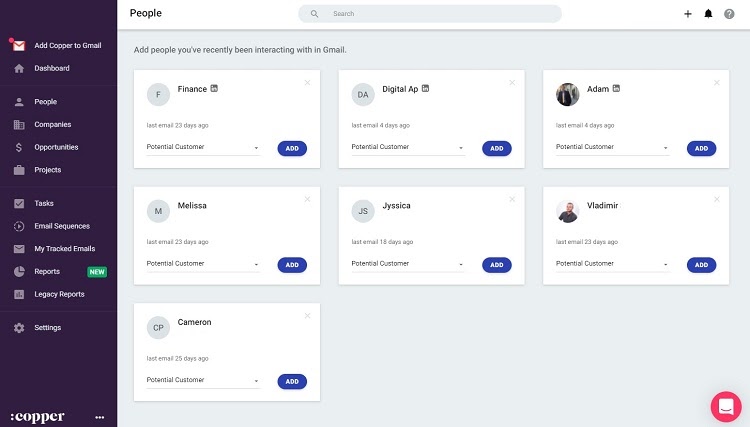
As a general rule and versus other CRMs, Copper works better for smaller organizations. Its Basic tier allows only three users, while the Professional and Business tiers do not have limits on the number of users.
Copper has good automated lead management features, an area where many small and medium-sized businesses struggle. However, for larger groups with dedicated marketing departments, lead management is less of a problem, which negates some of the strengths of Copper.
Copper’s Capabilities
CRM software provides services in a variety of categories for businesses. Think about which kinds of services your organization needs from its CRM software.
Some CRMs excel in a variety of areas, while others have a specialized area of strength.
Lead Management and Sales
The Copper CRM does a good job with lead management for small businesses, working almost like a personal assistant by suggesting potential leads for an organization. Copper performs searches through your organization’s linked Gmail and Google Calendar accounts to find potential leads, alerting you to them through automated suggestions.
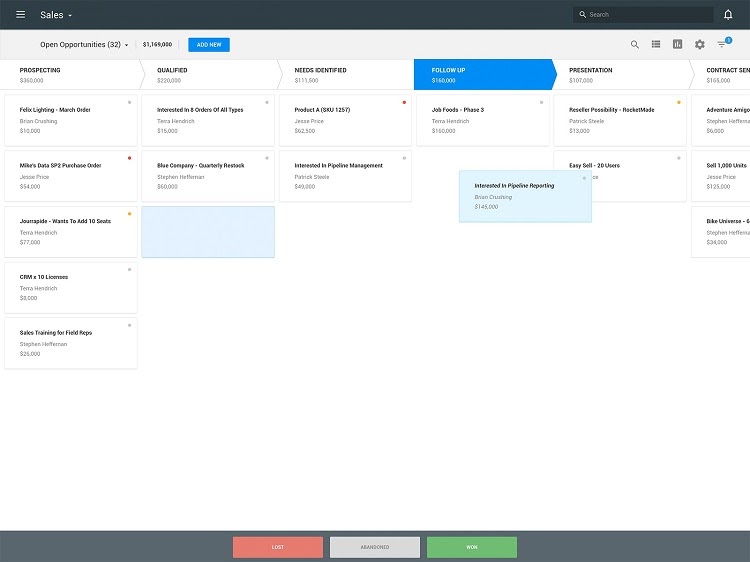
Copper can also track when potential clients open your emails, letting you know when to follow up with them because they showed enough interest to open the message.
As part of Copper’s administrative features, you can set up automated follow-ups to check on the leads and schedule calls.
For organizations that need advanced lead generation features, Salesflare outperforms Copper, but you’ll pay extra for its features.
Marketing
Copper doesn’t match up to other CRM tools when it comes to developing marketing campaigns. It focuses more on generating sales leads than on general marketing campaigns.
For CRMs with features that rank them near the top for marketing features, HubSpot and Salesforce would be great choices.
Project Management
Copper has a Projects tab that works similarly to a Kanban-style project board, using cards for creating tasks that the user can move through the To Do column, the In Progress column, and the Done/Completed column.
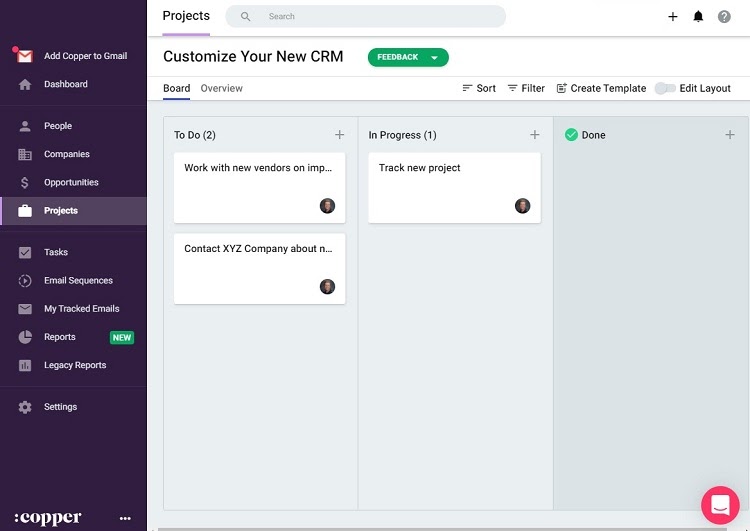
Add members of your team to different cards, giving them tasks. The task cards will integrate with the various Google apps you’re using, pulling tasks from Gmail into Copper if desired.
Copper certainly isn’t as detailed in its features in this area as a dedicated project management software package would be. But it will handle project management for organizations that have basic needs in this area.
Copper’s Integrations
To make CRM software easier to use, it should integrate with the other tools and processes you’re already using. When CRMs can pull data from integrations with email software, social media packages, and calendars, it saves time and prevents potential leads from slipping through the cracks.
Copper differs quite a bit from other CRM software in this area, as it focuses its integrations on apps from Google and Google Workspace, including Gmail, Google Sheets, Google Docs, Google Contacts, and Google Calendar.
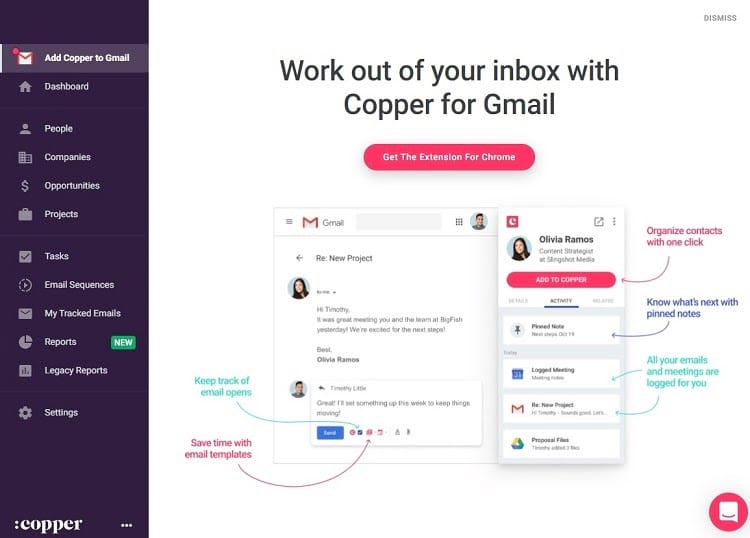
The Basic tier in Copper has limited integrations beyond Google apps, while the Professional and Business levels allow for integrations with several non-Google tools, including DocuSign, MailChimp, and QuickBooks.
Still, versus other CRM packages, Copper’s level of integration with third-party software lags by quite a bit. Unless you’re a dedicated user of Google apps and very few other third-party software packages, you may need to look elsewhere for a CRM package that has more options for using integrations.
We like Pipedrive as a high-quality CRM with multiple useful third-party integrations. Pipedrive provides more than 150 integrations, giving you a good chance of matching up with some obscure third-party software packages that your organization may use.
Copper’s Price
Copper is a cost-effective CRM option for organizations that don’t have a huge budget, as long as your group doesn’t need all the bells and whistles.
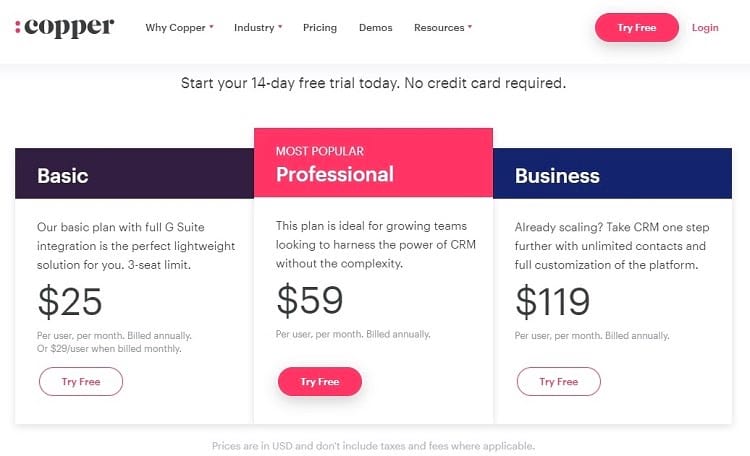
Here is more information on Copper’s three pricing tiers.
Basic
The Basic tier costs $25 to $29 per user per month. It has a limit of three users and a limit of 2,500 contacts per month.
It offers integration with most Google apps but will not integrate with third-party apps and software. It does not allow bulk email message generation.
If you only need the most basic features in a CRM and only have a few people who need to use the software, this Basic tier may meet your needs. Just understand that it has quite a few limitations.
Professional
The Professional tier costs $59 per user per month. There’s no limit on the number of users, but there is a limit of 15,000 contacts per month. For a mid-level pricing tier, 15,000 contacts are more than you’ll find with most other CRM packages.
It offers full Google Workspace integration, along with several third-party software integrations.
For a small team in the process of growing, the Professional tier is a great option. The majority of organizations that choose Copper will probably end up at least starting with the Professional tier. Many may never need more features than what the Professional tier offers.
Business
The Business tier costs $119 per user per month. There’s no limit on the number of users or contacts per month. Copper is one of the few CRMs that offer unlimited contacts at a price point this low.
This tier offers full Google Workspace integration, along with several third-party software integrations. It has full reporting features, including extensive customization options for reports.
Even though it doesn’t have a significant number of advantages over the Professional tier, the Business level is well worth considering for those who need unlimited contacts per month and advanced reporting features.
Users can try out any of the tiers for a 14-day free trial.
Pricing Versus Other CRM Packages
Other types of CRM software can carry a significantly higher price than Copper. The highest pricing tier for Salesforce is $300 per user per month, but Salesforce also offers a lower tier with a cost of $25 per user per month. Apptivo has a free tier and a $10 per user per month tier for those looking to spend as little as possible on a CRM.
Copper’s Ease of Use
Among CRM software, Copper is one of the options with the smallest learning curve. It is incredibly user-friendly.
The left pane contains all of the tools in the software, providing quick access. You’ll find menu topics across the top that reveal up-to-date tracking data in the working pane on the right.
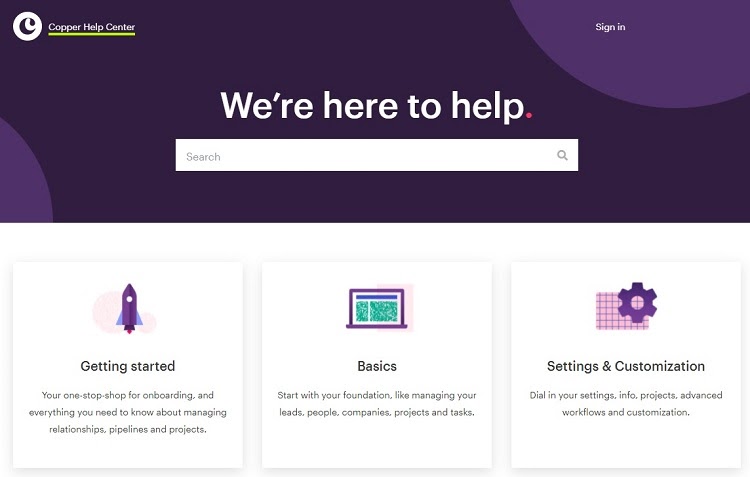
Additionally, Copper has an extensive help center available through its CRM interface, including a detailed FAQ and startup guide. Should you need to open a chat session with Copper, a support button at the lower right is always available.
Copper’s automated features for sending team members suggestions about potential sales leads and assigning tasks further simplify using the software. Some users dislike the large number of suggestions that Copper generates, though, finding them overwhelming.
For those seeking to use CRM features while out of the office, Copper has a mobile app that offers many of the same ease-of-use features found in the main cloud-based software package.
By focusing on offering the most basic CRM software features within Copper, its developers keep complexities out of the software versus more advanced CRMs.
Copper’s Report Generation Features
In addition to its legacy reporting features, Copper recently added customized reporting features to its advanced software tiers, allowing users to see a more precise representation of lead generation and conversion.
Users can select among preconfigured report parameters or specify the exact types of data to include with the report. The detail you can access with Copper’s reports is impressive, going as far as to provide reports on the communication levels between team members and their contacts.
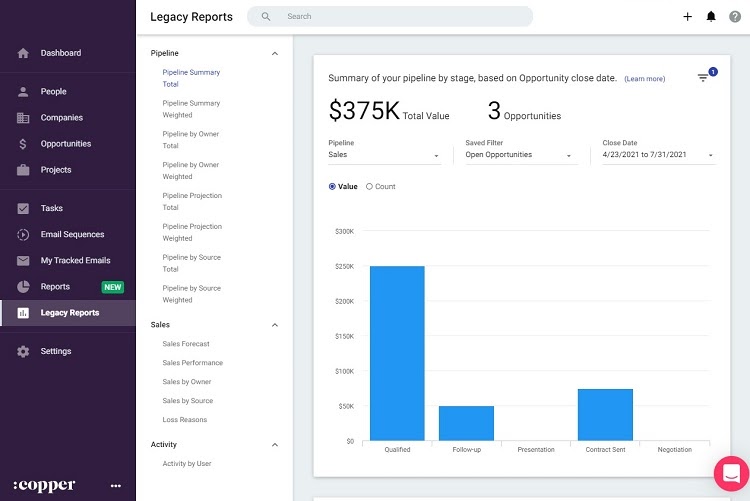
Because of Copper’s close integration with Google Workspace, its report generation features can use data Copper pulls directly from the Google Sheets app. This integration dramatically simplifies data entry and creating reports.
Through Copper’s reports, team members can track the success of sales conversion and any failures to convert leads into actual sales.
For those who need advanced report generation features at a greater level than Copper can generate, Pipedrive can collect large amounts of data and generate reports that provide insight into the organization’s level of success with sales.
Copper’s Security Measures
One of the areas where Copper compares very favorably to some of the more well-known CRM packages is its security measures. Copper’s designers clearly take security seriously, protecting both the data that passes through the software and the personal information of its subscribers.
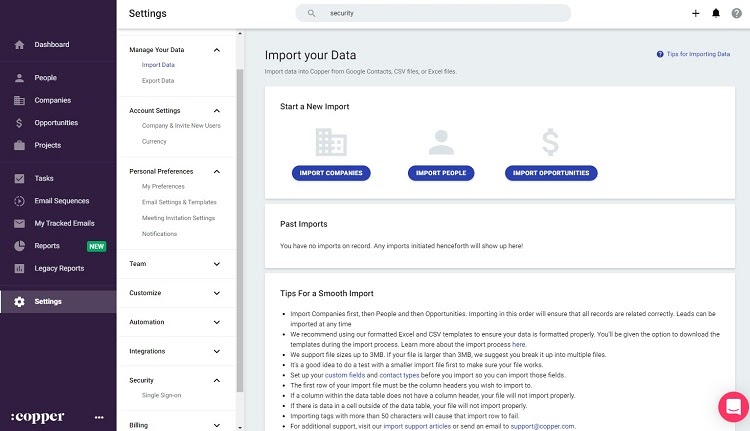
- Data Backups: Copper implements robust data backup practices, giving subscribers confidence that their data stored in the cloud will remain safe. Copper’s designers run constant testing on their data protection features, ensuring they remain up to date and as safe as possible.
- Two-Factor Authentication: Copper requires two-factor authentication as the default for sign-ins, but users can switch to a single sign-on process if desired.
- Private Emails: As a default, any emails synched through Copper have a private setting. Only administrators and account owners can view the private emails.
- Meets Google Security Standards: Copper closely follows Google’s privacy standards when integrating with the Google apps and handling any of your data that runs through those apps.
- Annual Audit: Copper follows Google Security Audit guidelines to ensure compliance with Google’s latest security standards.
For those who need to match the security requirements of FedRamp or HIPAA, though, Copper does not meet those compliance standards.
Copper’s CRM offering is not the most powerful option on the market, nor is it a particularly good option for large organizations. However, for small businesses and organizations that want to start using an easy-to-use and straightforward CRM, Copper is a smart choice.
Organizations that rely on Google apps for the majority of their communications needs or that have a subscription to Google Workspace will have the best chance of success with Copper. Google’s apps are simple and effective, and Copper follows this same type of design.


